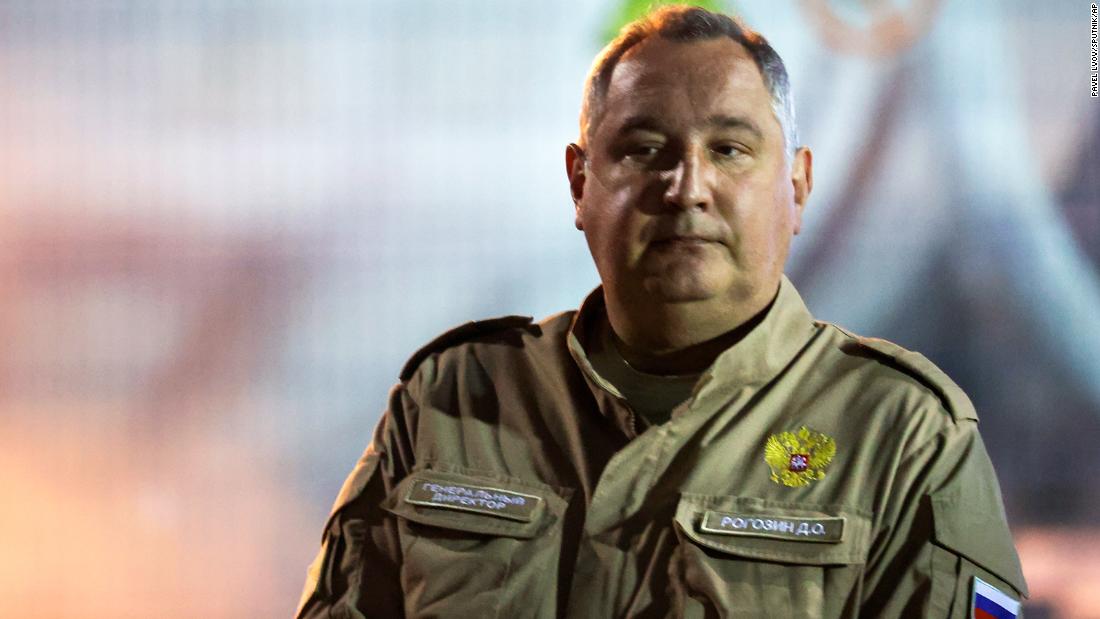
“This is a family where divorce is not possible,” Dmitry Rogozin told CNN in his first interview with Western media since he became CEO of Roscosmos.
“Either we are working together and then the sanctions should be lifted immediately, or we will not work together,” and Russia will deploy its own space station, Rogozin said in June, according to Russian state media TASS.
Now Rogozin seems to deny having made these threats before the lower house of the Russian parliament.
“I think there’s an interpretation problem. Most likely I didn’t say it,” Rogozin told CNN, speaking Russian. His words were translated by an interpreter hired by CNN.
“It’s that we’re talking about how we can continue our camaraderie, our friendly relations with our American partners, when the U.S. government is applying sanctions against the same organizations that supply the International Space Station.”
Another test for the US-Russia space partnership
It is a relationship that is being tested politically and in orbit.
“The team doesn’t break down on its own,” Rogozin said. “For 21 years, we haven’t done anything like that. An older generation, who knew how to dock such a complex structure like this, has retired.”
The incident has raised questions about the reliability of Roscosmos as NASA’s main partner on the International Space Station. But now that the 23-tonne Nauka, which adds Russian lab and bedroom space, is there and working, Rogozin says it is “the guarantee” that Russia will have the “technical capacity to operate the station so far in what will come to the end of its useful life “.
The United States and Russia have been partners in space since the Apollo-Soyuz Test Project in 1975, when an American Apollo spacecraft docked with a Soviet Soyuz capsule, indicating the end of the first space race. .
“I think cooperation with the Russians, which has been around since 1975, will continue,” said NASA administrator Bill Nelson, who spoke at the annual space symposium in Colorado Springs on Aug. 25.
The United States attempted to extend this association into space to the moon with NASA’s new Artemis program. But so far Russia has refused to participate.
“For that to happen, we demand decent conditions from NASA. We don’t want to be assistants or servants,” Rogozin said. “The main condition is equal rights when it comes to discussing issues and making joint decisions. That’s what we have today on the International Space Station.”
A relationship with another country as well
Rogozin insists Russia wants to preserve its space partnership with the United States. “We respect our partners in the U.S.,” Rogozin said. “We’re friends.”
But in June, Russia also announced plans to build a base on the moon with the world’s newest superpower in space: China.
Republican Sen. Jerry Moran of Kansas, a member of the Commerce, Justice and Science Allocations subcommittee ranking, says actions speak louder than words.
“Russia sent a clear signal in creating an alliance with China for lunar exploration instead of continuing its historic partnership by joining the United States,” said Moran, who spoke at the Space Symposium.
Pressed on whether Roscosmos is willing to potentially launch this decades-old partnership with NASA, Rogozin was no compromise.
“We’re glad you consider us a kind of bride, trying to trick one boyfriend and pick another, but that’s not the situation as it seems,” Rogozin said.
Rogozin wants Roscosmos to partner in space with both the United States and China. “If we are not able to work with the US, not because of us and I think this can be changed, but if this is not happening, to share the responsibility, the risks, the money, we naturally need another partner. said Rogozin.
Nelson plans to meet with Rogozin, probably in Russia, some year later.
When asked to respond to Rogozin’s comments, Nelson said, “I hope to continue cooperating with Roscosmos on the International Space Station until 2030 and in the future.” But Nelson did not address the specific conditions Rogozin demands before Russia signs the Artemis program.
At the end of a nearly hour-long interview, Rogozin said he had a final “big request” for the United States to preserve this experiment of decades of space diplomacy.
“America is a big country. As a big country, it has to be kind and wholehearted. It has to propose conditions for its Russian partner, which is much smaller because of the size of its population and the size of its economy. “If these conditions are worthy of us, we will accept it. The ball is in the hands of NASA, now in the hands of the United States.”